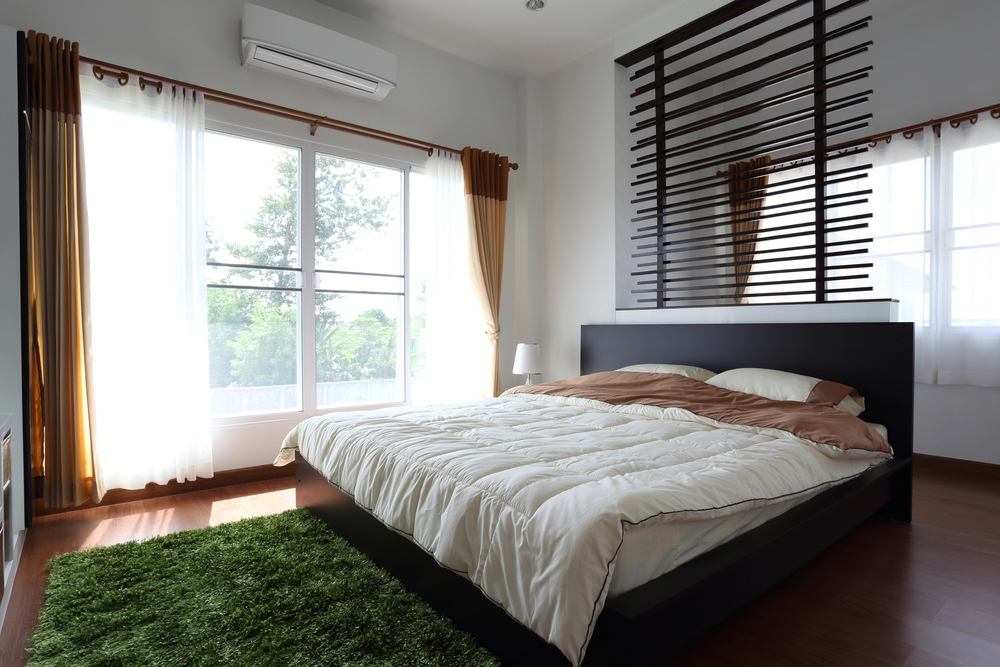
Sleep is vital for our physical and mental well-being, and the environment we sleep in plays a significant role in the quality of our rest. One of the main factors for getting a good night’s sleep and improving sleep quality is maintaining a comfortable temperature in your bedroom. One common way to do this is by using an air conditioner. But should you sleep with air conditioning on?
Continue reading to discover more about if it’s okay to use an air conditioner while you sleep.
Why Keeping Cool Matters
Our body temperature naturally drops as we sleep. Keeping the bedroom cool aids this process, helping us fall asleep faster and enjoy more restorative deep sleep.
Heat can disrupt sleep patterns, leading to decreased sleep quality, restless nights and groggy mornings. By keeping the bedroom cool, we promote uninterrupted sleep cycles and wake up feeling refreshed.
Sleeping in a hot, stuffy room can be uncomfortable and lead to tossing and turning. A cooler environment allows for more restful sleep.
Should You Sleep With Air Conditioning On?
While leaving the air conditioning on throughout the night can provide consistent comfort, there are some things to bear in mind.
Energy Consumption
Running the AC continuously can result in higher energy bills. Opting for energy-efficient air conditioning models and setting the temperature a few degrees higher can help reduce costs.
Maintenance
Continuous use may accelerate wear and tear on the AC unit. Regular maintenance, such as cleaning filters and checking for leaks, is essential to ensure optimal performance and longevity.
Environmental Impact
Excessive use of air conditioning contributes to greenhouse gas emissions. Considering alternative cooling methods, such as fans or natural ventilation, can reduce environmental impact.
Factors to Consider When Choosing an Air Conditioning Unit for Your Bedroom
Size and Capacity
Select an air conditioning unit with enough cooling capacity for the size of your bedroom. Undersized units may struggle to cool the space properly, while oversized units can lead to energy wastage.
Energy Efficiency
Look for air conditioning units with high energy efficiency ratings. Energy-efficient models consume less electricity, reducing both environmental impact and operating costs.
Noise Level
Consider the noise level of the AC unit, especially if you’re a light sleeper. Quieter models ensure minimal disruption during the night.
Additional Features
Explore features such as programmable timers, sleep modes, and remote control functionality for added convenience and comfort.
These features can also help reduce energy costs.
Debunking Side Effects of Sleeping in Air Conditioning
Contrary to popular belief, there are no significant health impacts associated with using air conditioning. While some may worry about issues such as respiratory problems or skin dryness, properly maintained AC units do not pose any health risks.
In fact, air conditioning can even improve indoor air quality by filtering out pollutants and allergens. As long as the AC unit is kept clean and well-maintained, there is no need for concern regarding its effects on health.
Best Temperature to Sleep in Aircon
The best temperature for sleeping in is between 18 to 22 degrees Celsius. This ideal temperature range is considered the best because it aligns with the body’s natural circadian rhythms, which typically lower core body temperature as you prepare for sleep.
Cooler temperatures help this process, signaling to the body that it’s time to rest. Sleeping in a slightly cooler environment can aid in achieving deeper and more restorative, quality sleep cycles.
However, individual preferences play a significant role, so it’s essential to find what works best for you.
Busselton Refrigeration and Air
The team at Busselton Air and Refrigeration are your trusted experts in air conditioning installation and service in the South West region. Say goodbye to uncomfortable hot summers. Our team is here to ensure your indoor climate is just right, year-round.
Whether you’re upgrading your current system or installing a brand-new unit, we’ve got you covered.
